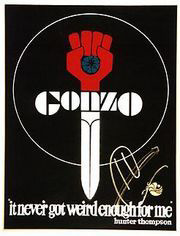 |
Hunter S. Thompson is dead. Long live the king.
Amid the guns, drugs and enormous expenses claims, Hunter Stockton Thompson created a new style of writing — gonzo journalism — and a generation of adherents. In the days after Thompson’s suicide, journalists from across the globe have weighed in on the importance of Thompson’s contribution to the canon of late twentieth century political discourse.
From Eric Homberger’s chronicling of Thompson’s life, published in The Guardian, to Tom Wolfe’s historical merry prankster retrospective, through to the perspective offered by author and political commentator Williams Rivers Pitt, to the voice of the man himself (audio via What Really Happened), when all is said and done all that is left to declaim is that Thompson will be sorely missed.
Thompson took pride in being the wild man of American journalism.
“As a journalist, I somehow managed to break most of the rules and still succeed,” he told biographer William McKeen. “It’s a hard thing for most of today’s journeymen journalists to understand, but only because they can’t do it.”
There is no more cogent evocation of what Thompson meant to political discourse than his writing on the passing of Richard Milhous Nixon, He Was A Crook. As Alexander Cockburn writes in counterpunch, “How Thompson said goodbye to Richard Nixon is as good a way to remember the high priest of gonzo as any …”
Richard Nixon is gone now and I am poorer for it. He was the real thing — a political monster straight out of Grendel and a very dangerous enemy. He could shake your hand and stab you in the back at the same time. He lied to his friends and betrayed the trust of his family.
It was Richard Nixon who got me into politics, and now that he’s gone, I feel lonely. He was a giant in his way. As long as Nixon was politically alive — and he was, all the way to the end — we could always be sure of finding the enemy on the Low Road. There was no need to look anywhere else for the evil bastard. He had the fighting instincts of a badger trapped by hounds. The badger will roll over on its back and emit a smell of death, which confuses the dogs and lures them in for the traditional ripping and tearing action. But it is usually the badger who does the ripping and tearing. It is a beast that fights best on its back: rolling under the throat of the enemy and seizing it by the head with all four claws. That was Nixon’s style — and if you forgot, he would kill you as a lesson to the others. Badgers don’t fight fair, bubba. That’s why God made dachshunds.
The remainder of Thompson’s Nixon retrospective is available here.